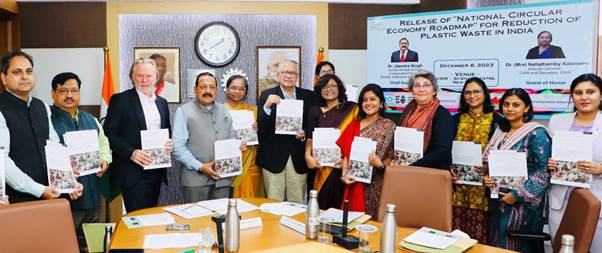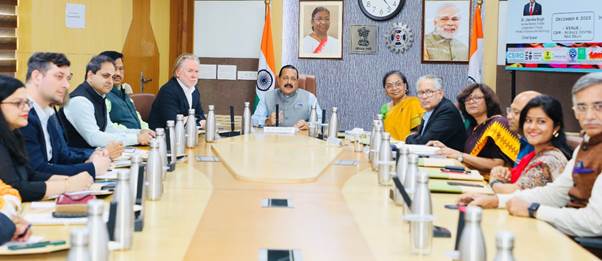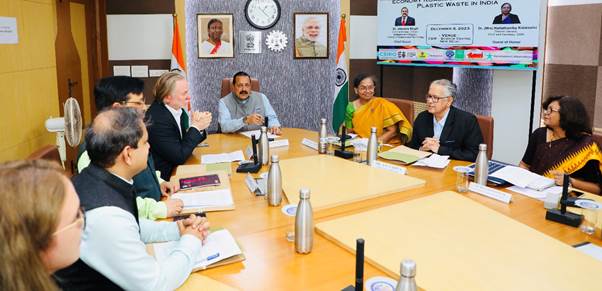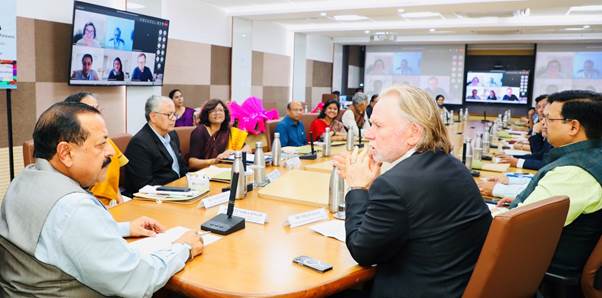Dr Jitendra Singh releases a flagship document on ‘National Circular Economy Roadmap for reduction of Plastic waste in India’
Union Minister Dr Jitendra Singh today released a flagship document on ‘National Circular Economy Roadmap for reduction of Plastic waste in India’, a collaborative exercise between leading research institutions from India and Australia.
The document aims to foster research and industry partnerships between the two countries and co-develop a roadmap for India’s transition to a circular economy in the Plastics sector.
India and Australia are active participants in the negotiations for formulation of a Global Plastics Treaty to be finalized next year. Both countries aim to leverage their respective strengths in waste management, recycling policies, and environmental initiatives to foster a circular economy that prioritizes resource efficiency and environmental protection.
The present research commenced in July 2020 as part of the India-Australia Comprehensive Strategic Partnership announced by the Indian and Australian Prime Ministers in June 2020.

Speaking at the launch of the document during a function in New Delhi, the Union Minister of State (Independent Charge) Science & Technology; MoS PMO, Personnel, Public Grievances, Pensions, Space and Atomic Energy, said India has taken the lead in its quest for a circular economy towards achieving the Net Zero target by 2070, as committed by Prime Minister Shri Narendra Modi.
Dr Jitendra Singh said, India’s Council of Scientific & Industrial Research (CSIR) is developing various technologies towards reducing India’s Carbon footprint and recycling.
“Swachhata campaign, inspired by PM Modi, has generated awareness about ‘waste to wealth’ concept. There is now also better mass understanding about the application of innovation and technology for Recycling and Reuse of Waste materials for productive means,” he said, pointing out that the Government has earned a total revenue of Rs.11,000 crore just by disposing of electronic scrap in the last three years.

Dr Jitendra Singh said, the Department of Science and Technology, Technology Development Board and CSIR recently launched the ‘Recycling on Wheels’ bus, which can generate Waste to Wealth at different spots due to its mobility.
“Dehra Dun based Indian Institute of Petroleum (CSIR-IIP) has jointly developed a Repurposed Used Cooking Oil (RUCO) van that collects used cooking oil and convert it into biofuel,” he said.
The S&T Minister said, CSIR- Central Road Research Institute (CRRI), New Delhi has pioneered the development of a revolutionary Steel slag road technology which facilitates the large-scale utilization of waste steel slag of steel plants in road construction.

Dr Jitendra Singh said, India has emerged as a pioneer in addressing issues of Climate Change, as envisioned by the Prime Minister Narendra Modi during the G20 New Delhi Summit. At India’s initiative, the Global Biofuels Alliance was set up on the sidelines of the G20 Summit, he said.
“PM Modi has unveiled the idea of making ‘Lifestyle for Environment’ (LiFE) a global Mission through bolder steps by the global clean energy fraternity,” he said.
Speaking on the occasion, Australian High Commissioner to India, Mr Philip Green said, the collaboration with India on Circular Economy is “important for Australia”. “Reducing Plastic Waste to Zero and achieving a circular economy is a difficult proposition, but possible,” he said.
In her address, Director General, CSIR and Secretary, DSIR, Dr (Mrs) N Kalaiselvi said that the world has moved from saying “No to Plastics” to “Biodegradable Plastics”. “We have to find the best to live with plastics,” she said.

The Government of India has been actively formulating policies and promoting projects to drive the country towards a circular economy. It has already notified various rules, such as the Plastic Waste Management Rules, e-Waste Management Rules, Construction and Demolition Waste Management Rules, Metals Recycling Policy, etc., in this regard.
India remains committed to address the plastic waste challenges and consequential human health and ecological impact concerns. Reducing Plastic Waste in India will help drive the transformation of the plastic waste economy in India into a circular economy. The introduction of the Plastic Waste Management Rules in 2016 for India has led to a raft of measures directed at municipal, industry, residential and commercial actors.

